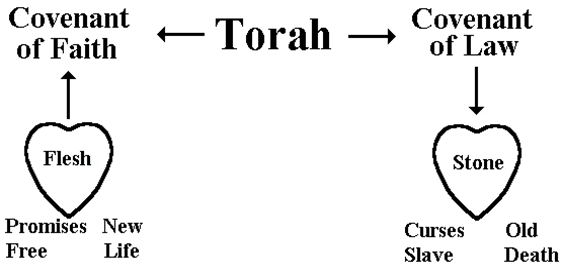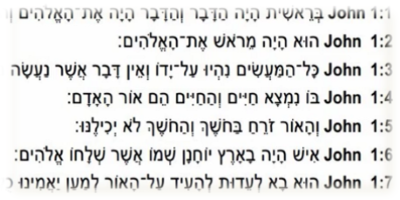Introduction
God has made an everlasting covenant with all men that exists throughout all time. Within the Old and New Testament books, this covenant has many names such as;
- New covenant
- New heart
- New spirit
- New creation
- Clean clothes
- Heart of flesh
- Kingdom of Heaven
- White robes
- Eternal life
The essential understanding of this covenant is that God formed man and placed within him a heart of flesh with his Torah written on it. Because of sin, this heart has been covered with a heart of stone. When one becomes reconciled with God, this heart of stone is removed revealing the heart of flesh allowing man to walk in the true Torah of God.
In the beginning
Genesis 2:7 And YHWH God formed the Adam of dust from the ground and breathed into his nostrils the breath of life and the man became a living being.
The word for "breath" is "נשמה / neshamah" and is a synonym of "רוח / ruach.” Both of these words have the meaning of "wind" or "breath". God placed within man his breath.
Genesis 1:26,27 And God said, we will make Adam in our shadow like our image .... And God created the Adam in his shadow.
Just as the shadow of a tree is a representation of the actual tree, we are to be a representation of God. When God placed his breath within Adam, he became a representation of God, a copy of his character. The character of God is truth (Psalms 31:5, Isaiah 65:16) and Adam was created to walk in this truth.
There are two words translated as truth, "אמן / amen" and "אמת / emet", both coming from the same root of "אמן / aman". Aman literally means to "support" someone or something. When God makes a promise, he remains true (amen) to his word and his word is truth (emet). The character of God is his word and his word is true (Psalms 33.4, 119:160).
The Torah
The words spoken by God to his people is his "תורה / torah / teachings" (usually translated as "law"). Throughout the Psalms we see that "the Word of God" is equated with the Torah (the teachings). Just as we find that the words of God are truth, we also see that his Torah is truth (Psalms 119:142).
The word "Torah" literally means "teachings" or "the path, pointed out by the teacher, that one is to follow" (Torah comes from the root yarah, meaning to "point"). Throughout the life of a child, the father trains, teaches, guides, and instructs his child in the proper paths to live a righteous (straight) life. If the child strays from these teachings, he is disciplined by his father in order to correct him. The teachings are imposed on him from the outside in order that these teachings will become internalized (written on his heart) bringing the child into maturity. Once the child becomes an adult, he is expected to continue in these paths without the supervision of the father. If he strays from the teachings there will be a natural occurrence of consequences. On the other hand, if he continues in them, there will be the reward of a happy and successful life.
When God breathed breath (spirit) into man, he placed within him his Torah, desiring that his people would walk in this Torah (Psalms 25.5, 26.3, 86.11, 119.30).
The Fall
Adam, created in the image of God, walked in the Torah of God, his character. When Adam rejected this Torah of truth and ate from the Tree of the knowledge of good and evil, the Torah, the heart of flesh, within him was covered over with a heart of stone.
From this point on, it is God's desire to remove this heart of stone and renew the heart of flesh in which man was created to walk in.
The Promise of a New Covenant
Ezekiel 11:19,20 And I will give to them a heart of renewal, and a breath of renewal I will give within them, and I will remove the heart of stone from their flesh and I will give to them a heart of flesh in order that they will walk in my statutes and laws, they will guard them and do them and they will be for me a people and I will be for them God.
Ezekiel 36:26 And I will give to them a heart of renewal and a breath of renewal I will give within them, and I will remove the heart of stone from their flesh and I will give to them a heart of flesh, and I will give within them my breath and I will cause them to do my statutes they are to walk and my laws they will guard and do them.
Jeremiah 31:31-33 Look, the days are coming declares YHWH and I will cut a covenant of renewal with the house of Yisrael (Israel) and the house of Yehudah (Judah), not like the covenant which I cut with their fathers in the day I was strong in hand to removed them from the land of Mitsraiym (Egypt) which they broke my covenant and I was a husband to them declares YHWH, for this is the covenant which I cut with the house of Yisrael after those days declares YHWH, I will give my Torah in among them and on their heart I will write it. and I will be to them for God and they will be for me a people.
The Cutting
Covenant making in the ancient Near East was done by "cutting" an animal as a sacrifice and using its blood to seal the covenant. For this reason, a covenant was often referred to as a "cutting". The Hebrew word for covenant is "ברית / beriyt" literally meaning "flesh" or "meat". There are two ways in which God "cuts" a "covenant" with his people. One is by "cutting" away the heart of stone to reveal the heart of "flesh". The other is in the more traditional manner of "cutting" of the "flesh" of an animal.
The covenant given at Mt. Sinai was done in the traditional form of cutting the flesh of an animal, whereas the Covenant of Renewal is done by cutting away the heart of stone to reveal the heart of flesh.
Torah of Faith
When this heart of flesh, which man was created to walk in, is revealed, the man will walk in the Torah (statutes and laws) naturally and in maturity. The man will have complete understanding in how to apply the Torah in each situation of his life, and a desire to do so.
The word "אמונה / emunah / faith", also from the root "אמן / aman", also means "to support" or "hold firm". The Hebrew understanding of faith in God is that one "holds onto", and "does" the teachings of God, not the English understanding where the action is placed solely on God. One who follows the Torah in this way, supports the Torah (keeping the Torah by faith).
Torah of Law
It was God's intention for his people, Israel, to walk in the Torah in this fashion. Since they refused, God entered into a covenant relationship with them to impose the Torah on them from the outside, as a father does to his children. This includes reward and punishment for doing what is right or wrong. One who follows the Torah in this way, is supported by the Torah (keeping the Torah as a law).
The Teachings of Paul
When Paul uses the word "faith", he is speaking of the Covenant of Renewal where one is mature in Torah. When he uses the word "law", he is speaking of the Covenant of Law given to Yisrael at Mt. Sinai where one is immature in Torah.
Christianity tries to understand the Covenant of Renewal outside of Torah causing a distorted understanding of what this covenant means. Messianic Judaism attempts to understand this same Covenant within the contexts of the original covenant given at Mt. Sinai, also distorting the understanding. Paul’s teachings of the Slave woman and the Free woman (Galations 4:21-31) help to show the Torah from its two perspectives, freedom through the Torah of faith and slavery through the Torah of law.
Tell me, you who want to be under the law, are you not aware of what the law says? (Gal 4:21)
We now understand that the term "under the law" is referring to the obedience to the Torah according to the covenant of Mt. Sinai where the Torah has become a law with reward and punishment.
For it is written that Abraham had two sons, one by the slave woman and the other by the free woman. His son by the slave woman was born in the ordinary way; but his son by the free woman was born as the result of a promise. These things may be taken figuratively, for the women represent two covenants. One covenant is from Mount Sinai and bears children who are to be slaves: This is Hagar. Now Hagar stands for Mount Sinai in Arabia and corresponds to the present city of Jerusalem, because she is in slavery with her children. But the Jerusalem that is above is free, and she is our mother. (Gal 4:22-26)
The one who lives the Torah in faith is free from curses as in the covenant given at Mt. Sinai. The same as an adult is free from the punishment of his father. Throughout Paul’s writings, he stresses the fact that this freedom does not release us from any responsibility in the Torah (Rom 3.31), but that we must walk in the Torah in maturity.
For it is written: "Be glad, O barren woman, who bears no children; break forth and cry aloud, you who have no labor pains; because more are the children of the desolate woman than of her who has a husband." Now you, brothers, like Isaac, are children of promise. (Gal 4:27-28)
The covenant given at Mt. Sinai was given as a blessing and a curse. The promises of the Covenant of Renewal, including; eternal life (Rom 2:6,7) and the רוח/spirit (Gal 3:14), come without the blessings or curses of the first covenant.
At that time the son born in the ordinary way persecuted the son born by the power of the Spirit. (Gal 4:29)
Throughout the history of Israel, those living according to the Torah of law tried to kill those, such as the prophets, that lived by the Torah of faith.
It is the same now. But what does the Scripture say? "Get rid of the slave woman and her son, for the slave woman's son will never share in the inheritance with the free woman's son." Therefore, brothers, we are not children of the slave woman, but of the free woman. (Gal 4:30-31)
With the end of the Covenant at Mt. Sinai, the inheritance of the promises goes to those in the New Covenant.
A New Creation
2 Cor 5:17,18 If anyone who is in Messiah, he is a new creation; the old has gone, the new has come. All this is from God, who reconciled us to himself through Messiah and gave us the ministry of reconciliation.
2 Cor 3:18 And we, who with unveiled faces all reflect the Lord's glory, are being transformed into his likeness with ever-increasing glory, which comes from the Lord, who is the Spirit.
Once the heart of flesh is renewed within us, we become reconciled to God. We are brought back to the state we were in before the fall. The breath (character) of God is restored with the Torah written on the heart."

Like what you’re discovering? Continue the journey from Bible reader to translator.
|






